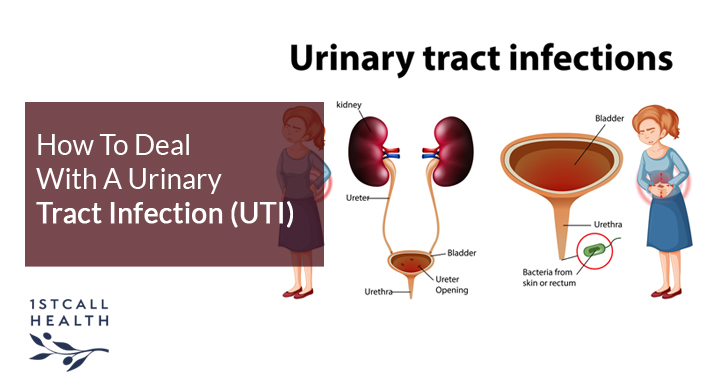
Any kind of illness or infection in your body can be disruptive to your life.
Especially when it impacts regular daily functions.
But it doesn’t have to be a major event like a stroke or a chronic disease like type 2 diabetes to be disruptive.
It can feel surprising when you feel pain or discomfort seemingly out of the blue, especially when you’re otherwise healthy.
This includes urinary tract infections.
Infections in your urinary tract can come on suddenly, and can be extremely uncomfortable.
And they affect a function you do a dozen times a day.
How do they happen?
How can you avoid them?
Should you seek out medical clinic services if you have one?
Let’s take a closer look at what UTIs are, and how to prevent them.
What Is A UTI?
A urinary tract infection, or UTI, is an infection within your urinary tract, which includes your bladder, urethra, and kidneys.
The lower urinary system, the bladder and the urethra, are most likely to be infected, with bladder infections being most common.
Though kidney infections are less common, they are typically more serious.
What Causes A UTI?
Urinary tract infections are caused by microbes, most typically bacteria, entering your urinary tract through the urethra.
The bacteria usually come from your skin or rectum.
If you’re not emptying your bladder properly, that can lead to a UTI.
Though anyone can get a UTI, there are some factors that put certain people at higher risk.
This includes:
- Being a senior
- Being a young child
- Being pregnant
- Having diabetes
- Having a weakened immune system
Women are generally at higher risk as well, primarily because they have a shorter urethra more easily infected by microbes from the vagina and rectum.
Some special circumstances, such as decreased movement following surgery, previous UTIs, or having kidney stones, can also increase risk of developing a UTI.
How Do You Know If You Have A UTI?
Symptoms of a urinary tract infection can differ slightly by person, and according to the location of the infection.
Infections of the lower urinary tract (the bladder and urethra) typically present with the following symptoms:
- Cloudy or bloody urine
- Increased frequency or urgency of urination
- Not passing much urine when you urinate
- A burning sensation when you urinate
- Urine with a strong odor
- Abdominal pain
- Rectal pain
Upper urinary tract infections are those affecting the kidneys.
These tend to have symptoms you might expect of an illness, including:
- High fever
- Chills
- Nausea and vomiting
- Pain in your upper back
- Pain in your kidneys (just above the bottom of your ribcage
Kidney infections can be potentially life threatening if not treated, as bacteria can move from the kidneys into the blood, causing sepsis.
Medical Treatments For UTI
Before treating you for a UTI, your doctor will want to confirm that that’s what’s causing your symptoms.
Some other infections, such as certain sexually transmitted infections, can have similar symptoms to UTIs.
So does interstitial cystitis (bladder inflammation) or bladder blockage.
This is why it’s important to see your primary care provider if you suspect you have a UTI.
Your doctor will likely ask you about your symptoms, and examine you.
If necessary, they will order urine tests.
The testing will tell your doctor whether you have a UTI and what kind you have – bacterial, viral, or fungal.
That will help them choose an appropriate treatment.
Bacterial infections are treated with antibiotics, viral infections are treated with antivirals, and fungal infections are treated with antifungals.
UTI symptoms will typically improve within a couple days of beginning treatment.
Natural UTI Solutions
Medication is, of course, not the only option to help prevent and mitigate urinary tract infections.
Natural remedies will not cure a UTI you already have, but they may help you feel better until your body clears the infection.
They may also help your medication work more effectively, and they can help keep you from getting further UTIs.
Let’s look at a few things you can be doing every day to help decrease your chances of getting a UTI.
1. Stay Hydrated
Making sure you drink enough water is important for both treatment and prevention of UTIs.
Staying hydrated, and urinating more frequently, can help to flush bad bacteria from your urinary tract.
Urinating can be uncomfortable when you have a UTI, but it’s good to try to do it more, not less.
2. Take Probiotics
Probiotics introduce good bacteria into your body.
They help support healthy digestive and immune systems.
When you have a UTI, bad bacteria replace and outnumber good bacteria in your urinary tract.
There is some evidence that taking probiotics regularly can help to prevent urinary tract infections, and, in conjunction with antibiotics, help to treat existing infections.
Probiotics may also be beneficial if you have Crohn’s disease and other digestive issues, but research is limited on the subject.

3. Eat More Cranberries
Some studies have found that cranberries contain a substance that can potentially prevent bacteria from sticking to the walls of your urinary tract.
Regular ingestion of cranberries may help to reduce risk of future UTIs, but does not help to treat or improve existing infection.
Cranberries can be ingested in several forms, including juice, supplements, or as dried fruit.
Cranberries are also a great source of vitamin C, and speaking of which…
4. Get Enough Vitamin C
Though studies have found inconclusive evidence, some research suggests that vitamin C may help to treat UTIs.
Vitamin C helps support your immune system, so it may have some benefit in fighting off infections, as well.
Vitamin C can be found in many natural foods, and also in supplements.
5. Avoid Holding Your Urine
With increased water intake comes increased need to urinate.
Always make sure that you’re using the bathroom when you need to.
Holding your urine can cause bacteria to multiply in your urinary tract, contributing to an increased risk of infection.
Additionally, it’s important to always fully empty your bladder each time you urinate, wipe gently from front to back, and urinate after any sexual activity.
These steps can help to prevent any future urinary tract infections.
Book Your Appointment With 1stCallHealth Today
Urinary tract infections, like any illness, can be inconvenient and uncomfortable.
It’s so important to use the prevention tips above to help avoid microbes being introduced into your delicate urinary tract.
If you do find yourself with symptoms of a UTI, there are some steps you can take to relieve your discomfort while you wait for treatment.
Here at 1stCallHealth, we can help with UTIs, as well as any other health concerns you may have, and all at an affordable rate.
Book your appointment with 1stCallHealth today.
1stCallHEALTH
1331 H St NW Ste 200,
Washington, DC 20005
(202) 590-0009
– https://goo.gl/maps/MVhjkz2jqynWpsgo6
1stCallHEALTH provides affordable access to primary care services. We believe that everyone deserves affordable, high quality primary care. Our vision is to challenge the status quo, focus on the individual, and empower personal control to change the way we think about healthcare.




